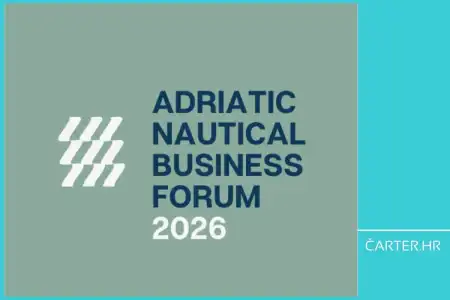
In his new article, Ivica Žuro gives us an insight into the financial challenges brought by the increase in interest rates in the nautical sector. Find out what are the potential strategies for adaptation as well as financing and lending options.
For some, the season of full momentum in operations or, as one prominent skipper from Tivat said: The ninth circle of hell, is the hottest part of the year.
For the media it may be “pickle season”, for most people it's the countdown to vacation or the start of the school year.
For us at čarter.hr, the whole year is the season because - no matter how much the fleet is idle for a part - there are many more accompanying constant actions necessary for the smooth running of the business. Especially in these interesting times where one year represents a valuable experience, but you never know what situation will arise in half a year.
But we think positively and look at it that way. Let's go hard as you know which brothers whose surname starts with letter M.

Increase in interest rates on loans
First, we will look at what is the biggest potential cost, probably in the short and medium term, that is, this year and the next. It is about the increase in interest rates on loans, as a result of the introduction of the euro and the fight against inflation. And which was again the consequence of a series of political and geopolitical moves. But we don't want politics in our shop, as the barber Roko from Velo Misto said, and then gets stuck in prison for singing every time the government changes.
It is about the increase in reference interest rates raised by the European Central Bank (ECB), with a delay compared to the monetary authorities of the USA and the United Kingdom. The logic behind this frequent move is that an increase in interest rates reduces the demand for loans, which in turn reduces the demand for products and services and lowers their prices.
That is the goal this time as well. It's just a small problem that the perfect storm of money printing and throwing into the system occurred during the pandemic, followed by the energy crisis and of course greed beyond the usual level after the price of energy was reduced to former levels. When prices were rising - the justification was the increase in gas prices as an input to the price of electricity, now that the situation has calmed down there is no drop in the general level of prices.
The increase in interest rates means for legal entities a stricter risk assessment policy and a higher rate of rejection of loan requests, as well as stricter conditions for obtaining financing both through lending and through leasing, which is particularly interesting for fleets.
What the legislator can do for entrepreneurs' investments is to expand the support program through credit guarantees, which will be supported by HAMAG and HBOR.
The ECB's plan is to bring the inflation rate to levels of around 2% by the end of 2024 and it is left to each country to do what they want to do with the general guidelines.
And what do domestic banks do? Well, to put it colloquially, they swim in the sea freed by entering the European monetary system and act as money market funds, lending money to monetary institutions at an annual interest rate of 4% and investing in bonds of reliable issuers.
However, such situation will not last forever, and the client base needs to be preserved.
Being a money fund is not a sustainable business model, nor is it the purpose of domestic banks' operations. Those who do not take enough care of their clients today, could be at a loss tomorrow, and experience shows that the costs of returning an old client are up to 4 times higher than those invested in keeping the existing base.
A reasonable move would be to form internal guarantee schemes for small and medium-sized enterprises and enable their current and future clients to receive financing on acceptable terms.
Until this happens, if you need financing the smartest thing is to check what options are available. It is surprising that some banks did not raise interest rates on fixed loans for companies too much.

Overview of the current business situation
After the general review, according to accepted practice, we will also look at the current business situation.
This time, we are focusing on the sale of business shares of limited liability companies in which the owners and those who take over do not have sufficient creditworthiness, but that is why the legal entity is doing very well, if not excellent, according to all indicators.
At some point, it will happen that one of the owners wants out and is not ready to agree to be paid as soon as possible with annual payments or a share of the profit.
Then a basic question appears that troubles not only the management of domestic ABA basketball clubs - how to get funds as soon as possible for the implementation of the mentioned operation.
An additional weight is that it basically deals with the financing of the acquisition of property by a natural person with a loan that will be paid by a legal entity, which in the majority of domestic banks is a big red flag and a big no-no.
Although the whole story makes sense and has been known since the time of managerial loans in privatization - since Croatian financial institutions for business lending are owned by foreign multinational chains - it is clear that they are not interested in everything that has even a hint of reputational risk.
Then there are two solutions that can be considered:
- loan from another company
- bank financing.
We mention financing by an external legal entity because it is increasingly the case that domestic companies with operations in the technical domain have the means to invest and show interest in such moves, because inflation and primitive investment opportunities on the domestic market are eating up money.
In addition, the nautical sector is quite interesting for them as it is resistant to a lot of things, and it is also a generator of income.
This solution is quite fast, and the disadvantage for the borrower is that the creditor will not ask for one kidney as a pledge because the other one is enough for him, but will want various pledges and try to have the last word on the payment of the profit. Which is logical - whoever brought the ball to the school playground is the first to choose the team.
Another conventional and slower solution is to go to the bank for an interview and make a takeover model.
Not the ownership shares, but the brand that the co-owned company owns, has developed and is recognizable on the market.
This includes proving that the co-owner who is selling the share is the creator of the brand and the intellectual owner of the aforementioned, even though he has not registered it in the patent office but has documentation that says he invested from the very beginning. And of course other members of the company acknowledge and confirm this in writing.
After the brand is bought and transferred to the ownership of the company, the only thing left to do is exit the ownership structure of the company.
This was the simplest description of the whole story, which includes a documented evaluation of the brand's value and a reflection on the business itself, including the marketing aspect as primary and underlined by the financial result and further projection of the business.
Of course, you won't be cutting your life short by getting into that business or getting gray hair if you only have cute George Clooney sideburns.
It's a shame not to use čarter.hr when there are already people in your team and among partners who can bring this work to an end.
Categories of trends
- News
- Sale
- Marketing
- SEO
- Web design
- Social media
- Technology
- Regulations
- Management
- Education
- Finances
- User experience
Newsletter
Sign up for the newsletter and receive the latest trends and tips straight to your inbox




